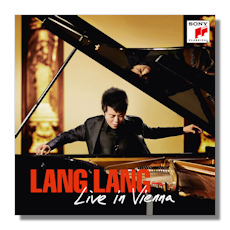
The Internet's Premier Classical Music Source
Related Links
-
Albéniz Reviews
Beethoven Reviews
Chopin Reviews
Prokofieff Reviews - Latest Reviews
- More Reviews
-
By Composer
-
Collections
DVD & Blu-ray
Books
Concert Reviews
Articles/Interviews
Software
Audio
Search Amazon
Recommended Links
Site News
 CD Review
CD Review
Lang Lang Live in Vienna

- Ludwig van Beethoven:
- Sonata for Piano #3 in C Major, Op. 2 #3
- Sonata for Piano #23 "Appassionata" in F minor, Op. 57
- Isaac Albéniz: Suite Iberia - Book 1:
- #1 - Evocación
- #2 - El Puerto
- #3 - Fête-dieu à Seville
- Serge Prokofieff: Sonata for Piano #7 in B Flat Major, Op. 83
- Frédéric Chopin:
- Etude in A Flat Major, Op. 25 #1
- Polonaise "Heroic" in A Flat Major, Op. 53
- Waltz "Valse brillante" in A Flat Major, Op. 34 #1
Lang Lang, piano
Sony Classical 8869-771901 2CDs
Also available on 2CD+Bonus DVD set 771900:
Amazon
- UK
- Germany
- Canada
- France
- Japan
- ArkivMusic
- CD Universe
- JPC
and on DVD 772414:
Amazon
- UK
- Germany
- Canada
- France
- Japan
- ArkivMusic
- CD Universe
- JPC
and on Blu-ray 771902:
Amazon
- UK
- Germany
- Canada
- France
- Japan
- ArkivMusic
- CD Universe
- JPC
and on Vinyl LDL9011:
Amazon
- UK
- Germany
- Canada
- France
- Japan
- JPC
This recording is certainly further evidence that Lang Lang is a charismatic presence on stage, an artist who can send the audience cheering wildly after they've sat in rapt silence watching and listening. Taken from recitals given February 27 – March 1, 2010 at the Musikverein in Vienna, this double-CD set (a DVD is also available) times out to nearly two hours and contains, as you can glean from the headnote, a broad array of challenging works by Beethoven, Prokofiev, Chopin and Albéniz.
Lang leads off with the Beethoven Third Sonata, a work that opens with a quirky start-and-stop theme of utterly infectious character. He never shortchanges the high spirits here as he infuses the music with all manner of ebullience and cheer. Lang delivers the ensuing Adagio darkly and ponderously, deftly contrasting its serious mood with the euphoria and bliss of the opening panel. The Scherzo is light and spirited and the finale joyous in its energetic playfulness. All in all, a fine performance.
In the Appassionata Sonata Lang plumbs the depths for a greater artistic yield. He offers a darker, heavier, less agitated first movement, where pianists like Schnabel and Brendel are leaner and starker. In the second movement the same holds true: Lang is solemn and less animated as he seeks out the treasures. On the whole his readings of these movements are compelling, but demand greater patience from the listener. The finale is agitated and brimming with energy. Here Lang is more mainstream and crowns the work with a powerful and fully convincing performance of this turbulent panel. The closing pages are especially thrilling in their hellbent drive.
The three Albéniz pieces lead off the second disc. Lang does right well with them, presenting an especially colorful reading of #3, Fête-dieu à Seville. Alicia de Larrocha is difficult to beat in this repertory. She presents leaner and more idiomatic readings, though Lang is convincing in his own way.
In the notes Lang speaks of his admiration for Horowitz, Richter and Sokolov in their respective recordings of the Prokofiev Seventh Sonata, the middle of the trio of so-called "War Sonatas". Listening to Lang's interpretation, however, you'd never suspect a connection to either Horowitz or Richter. Lang presents a more measured, more epic view of the work. At 9:24 his first movement is one of the longest on record: Horowitz clocks in at 8:10; Richter at 8:00; but Sokolov, at 9:17, is similarly expansive in his approach. One thing you notice in Lang's first movement is his very soft pianos. In the reprise, he plays certain notes in the dark lyrical theme so softly you can barely hear them. He seems to read p as ppp. His performance, however, is still quite compelling: the second movement is brooding and filled with tension and the finale is breathless and utterly thrilling, the audience responding with profuse cheers and applause.
The three encores by Chopin were also crowd pleasers: the Polonaise for Piano in A flat was a bravura performance that might not have been exactly what the composer intended, but certainly wasn't short on thrills. The Op. 25 A Flat Major Etude, the first encore, was sensitively played, as was the sprightly concluding Valse brillante.
The sound on all works was vivid and quite powerful. Overall, this was an excellent if slightly uneven effort by Lang Lang, a pianist who may well develop the kind of mystical charisma wielded by Horowitz and Argerich. Time will tell.
Copyright © 2010, Robert Cummings.





















